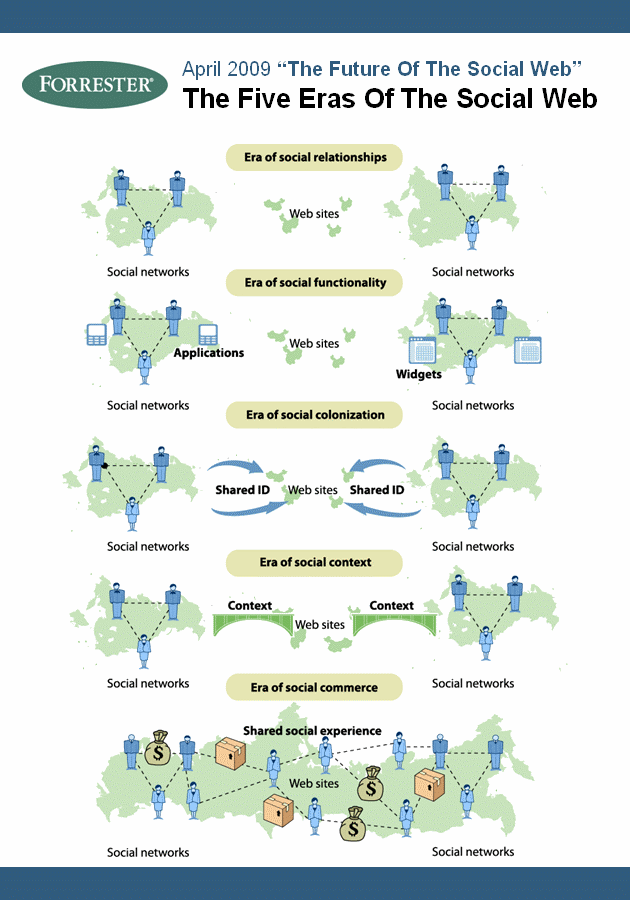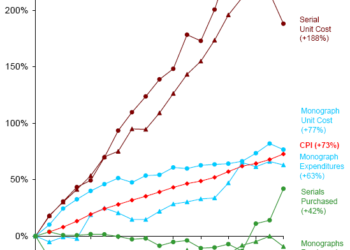
As a wise man recently pointed out to me, “Social media has overtaken pornography as the number one online activity.”
Go figure.
So even after all the blogging and Twittering from the SSP Annual Meeting last week, I have one more post about the event, this one emanating from a luncheon roundtable on Friday. The topic? Social media in publishing.
It was a tremendous group of people with a lot to say, and I found it eye-opening in many ways.
Here’s a quick breakdown of the insights:
- Identity management is an issue because there’s no common standard. This inhibits publishers because we can’t assign rights to an individual and know that it’s them, from publisher to publisher, or across time.
- Creating an identity is difficult for users and forces publishers to reinvent the wheel. Does Facebook Connect offer a path toward ease of adoption?
- Balancing community and quality might be a false tradeoff. A “crowd” threatens quality, but a “community” doesn’t.
- Forrester’s “Five Eras of the Social Web” is a picture worth contemplating (click on the image to see it full-size).
- Enabling mavens and connectors (things Malcolm Gladwell outlined in “The Tipping Point“) scares publishers. We’re used to being the mavens and the connectors.
- Marketing social media is terra incognita for publishers. We’re going to have to learn. This may mean dropping commercial expectations from the picture while we do so.
- Our businesses have legacy expectations, especially around metrics. So, if a social media experiment doesn’t automatically generate the kind of numbers in 2 weeks that our publishing enterprise has generated in 50 years, it’s held up through a false comparison and labeled a failure.
- Recruiting talent is acceptable through known channels (i.e., acquisitions editors), but makes people nervous if the talent is sourced through social media (i.e., the natural emergence of expert users and mavens).
- Linkages of social media to legacy brands is making people nervous.
- Ultimately, it has to be financially sustainable. How that will happen isn’t clear yet.
The answer to a lot of these predicaments was almost always something like, “Get over it.” The social media space is only growing, and we’re still in its infancy, with device convergence and bandwidth immersion likely to drive it deeper into our lives.
It’s not going away, folks. It’s going to define the next few eras of the Web.
Discussion
8 Thoughts on "Social Networking – Tips, Tricks, and Talent"
While social media may have overtaken pornography in terms of traffic, I’d be willing to bet they’re not even close in terms of revenue and profitability. As you note in your last point, the business model for pornography is obvious, for social media it’s non-existent.
Actually, some reports indicate that social networking is really messing up the business models of the pornographers. DVD sales are plummeting apparently and piracy is a major issue as well.(I think I read this in Wired – so it must be true ;-).) WRT social media business models, I think linked-in are doing pretty well, and Myspace were/are profitable. I think twitter are looking a lot like the early days of Google (tons of potential, where will they go?). Facebook -hmmm personally, I think this looks very exposed to the risk of the fad.
I believe the HitWise report that claimed that social media had overtaken pornography in popularity can be found here:
http://weblogs.hitwise.com/robin-goad/2009/01/social_networks_overtake_adult_websites.html
I was lucky enough to be sitting at the other roundtable on the social media topic. There the tenor of the remarks was more experimental and pragmatic, and less fearful, I think. People had jumped in, tried things out, and were looking for advice about how to take it to the next level. Luckily we had people like Adam Weiss, Julie Noblitt, Tina Moir, and some sharp folks from ACS to share examples.
I’d very much like to have been at this event. I have too much to say in response as a comment, so if I may, I’ll link to a blog post: http://tr.im/nhCY
Get over it, indeed. Another issue that has been raised is how uncomfortable some publishers and author feel when they’re linked to from a part of the web they don’t generally associate themselves with.
Re: Facebook Connect. Not everyone uses Facebook. Given their blatant abuse of privacy, I think they’re a bad model to follow. If it’s important enough, people can overcome the minimal hurdle required to get an OpenID, which is better anyways because it’s distributed and vendor-neutral.
The point here was to use whatever the users are comfortable with. If they are happy with facebook connect so be it. (as it happens I’m totally with you on facebook by the way). Open ID is a great idea with absolutely hideous usability issues. It’s a shame because there’s some real possibilities here. Mozilla’s Weave may hold some promise to improve on this situation. Agree with you on the vendor neutrality issue etc – very important.
But really, the point was about the cost/benefit of publishers building identification systems and forcing users to adopt them to unlock added functions on our platforms – there’s some anecdotal evidence that personalisation features garner about 5% usage. Which is a real issue given the cost of building the things. I think we can unlock much higher usae by meeting the users where they are, and not where we currently want them to be.
![Reblog this post [with Zemanta]](http://img.zemanta.com/reblog_e.png?x-id=657f2186-a270-4585-a759-9db1930ec589)



